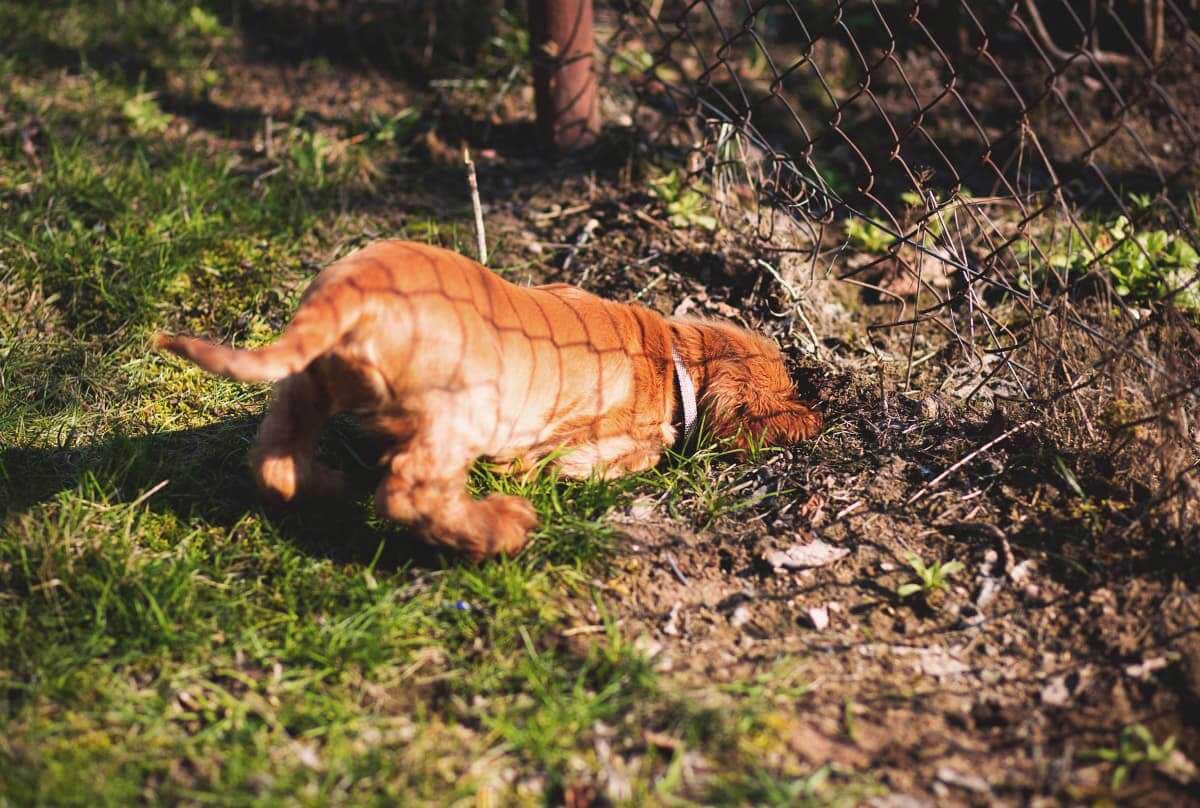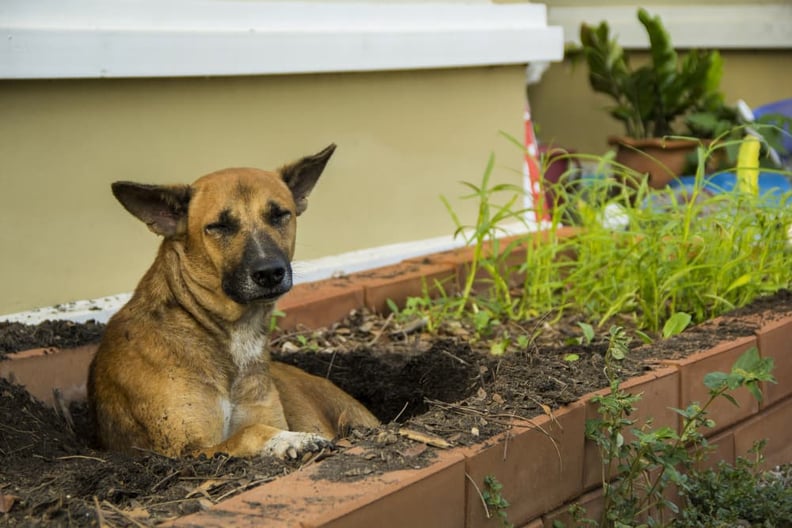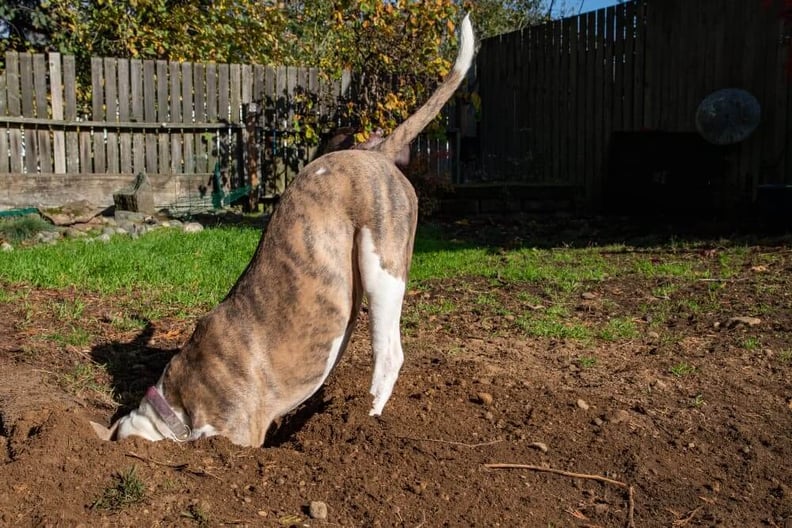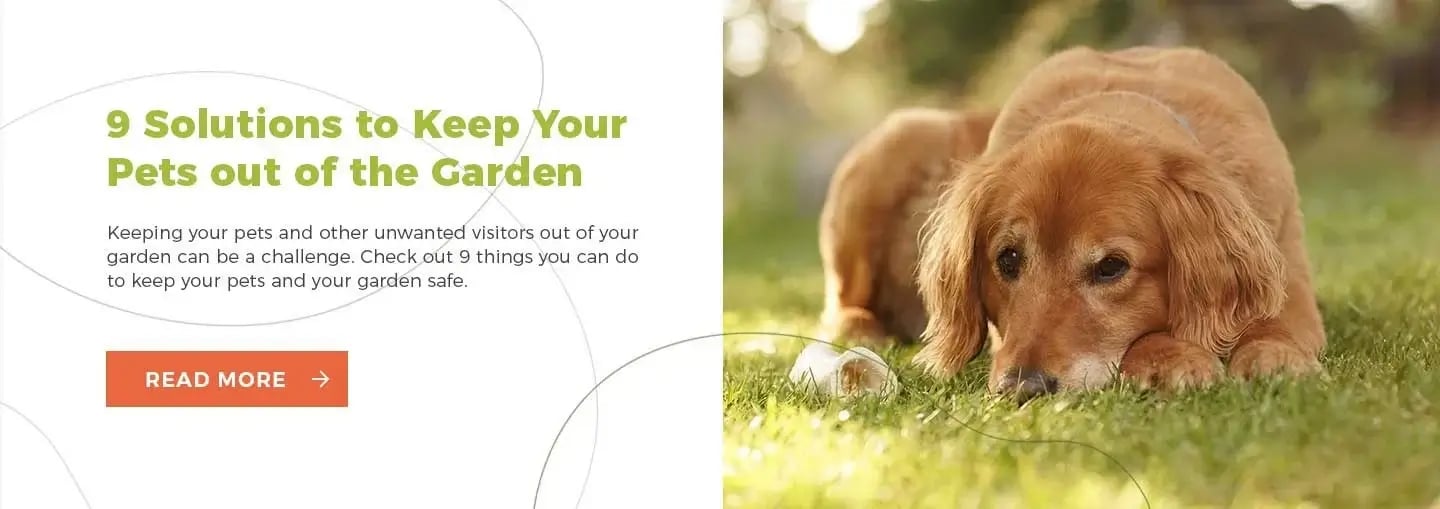
Your once pristine yard is now covered in holes, and your puppy looks suspiciously satisfied. Learn why do dogs dig and how to stop dog from digging to save your yard.
Owning a dog comes with many ups and downs— and some of those downs can do some real damage to your lawn. No, we aren't talking about dog pee killing grass. We are talking about catching your dog digging holes in your lawn and vegetable garden.
Dog digging can be a source of frustration. Their seemingly inexplicable passion for burrowing into the ground leaves ruts in the yard, ruining the lawn and creating the potential for injury if someone steps in a hole.
In this article, you’ll learn how to get a dog to stop digging area and positively redirect their efforts, but first, it’s important to understand why your dog loves to dig:
Why Do Dogs Dig Holes?
No one wants their yard to be full of holes and divots from a playful pooch. Stopping these destructive behaviours starts with understanding why your dog likes to dig in the first place.
Dogs dig holes for several reasons. Do any of these sound familiar?
Hunting
One of the most common reasons for destructive dog digging is that they're trying to access something you can't detect or don't know about, such as a mole burrowing through the ground or a bone they've hidden for safekeeping.
Hiding
Alternatively, they could be burying something they don't want another predator to take. Dog toys, a raw dog bone, or even a stick could be important enough for your dog to protect from others.
Hiding their favourite things in the yard is a great way to cover the scent and prevent other animals from enjoying their precious belongings. The trick is remembering where they buried it!
Dog Boredom
Some dogs dig because they're bored or feel ignored and want attention. This is typical behaviour among dogs who don't have many dog toys and are left alone with minimal daily activities for extended periods.
Digging in the dirt or your garden is one way to make sure your dog gets your attention and relieves some of his frustrations. Plus, it’s an activity to keep them occupied when they are bored.
Is Your Dog Bored? Find out other signs in Bored Dogs: Symptoms & Solutions for Dog Boredom.
Why do dogs dig in bed? If your dog doesn’t have a yard, you may find him digging in the house. This is why dogs dig carpet, blankets, and even their dog bed.
Dog Anxiety
Your dog may also feel anxious and need comfort. Dogs that suffer from anxiety may exhibit destructive digging habits. Much like boredom, digging gives them something to focus on to relieve the stress.
Prison Break
Other dogs are trying to be escape artists looking for a way out of their confined area to go for a stroll on the town. In some cases, they might smell a potential mate nearby, and dogs dig out under a fence to look for a hot date.
Alternatively, they may feel anxious about something related to your home—dog separation anxiety, for example— and try to get out to find comfort.
Temperature Control
Dogs with heavy coats will often dig holes to access the cool earth underneath during hot summer days, similar to other animals rolling in the mud. This is a survival instinct and a good indicator that your pooch is not into hot weather.
If you catch your dog lying in holes that he dug on hot days, consider trying a dog cooling vest and check out How to Cool Down a Dog to learn the dangers of dogs overheating.
Just Because
Finally, some dogs are just diggers. It's in their blood to dig holes. They like digging holes. Digging holes is fun. Once a digging habit is built, it can be hard to break. Even if your dog started digging for another reason, now he may just be used to it and enjoy it.
Determining why your dog is digging holes is an important first step in finding the best way to handle it. While it might take some trial and error, there are a few things to look for:
-
- Does your dog always dig in the same spot?
- Are there patterns to when your dog digs?
- Does your dog have access to other forms of entertainment in your yard?
- How long are they in the yard before they start digging holes?
Pay attention, look for patterns, and then use trial and error with the strategies listed below.
5 Dangers of Destructive Dog Digging

Is dog digging dangerous? While your main concern may be the unsightly holes in your yard, there are other reasons to break this bad habit. Take a look at the risks of dog digging and why you should take action:
1. Nail Damage
The biggest health concern for dogs that love to dig is the risk of nail damage. Soft dirt is unlikely to cause damage, but frozen or dry dirt, small rocks, and tree roots can catch your dog's nails, cracking or breaking them.
It's also a good idea to keep your dog's nails trimmed and healthy just in case they dig. The longer the nails, the more likely they will get damaged if your dog digs.
2. Dangerous Snacks
If your dog is digging holes to hunt, you run the risk of them achieving their goal. Common prey for domesticated dogs can include mice, moles, and rabbits, all of which could carry parasites or even rabies.
You also never know what your dog might find in the ground. Garbage and litter might look like a treasure but are hazardous if they decide to eat it.
Another thing to watch out for is your dog eating dirt. This could be a sign of a nutritional deficiency.
3. Pests
Some common pests like to hide in the grass and dirt. Your dog’s curious digging problem can unearth and disturb these pests, increasing the chances that they might latch onto your pooch. Mosquitos, fleas, and ticks are just some of the pests that could infest your dog.
4. Pesticides and Chemicals
If your dog likes to dig often when you are on a walk, be aware of any pesticides or lawn treatments your neighbours might be using. It might look like plain old grass, but your dog could be digging in the ground covered in toxic chemicals that could irritate his paws or respiratory system.
5. Garden Goodies
If your dog loves digging, your garden might be its next target. They won't have to dig very deep to find some tasty treasures. Not only will your dog seriously damage your beautiful garden, but some of your favourite plants could be toxic to your pooch.
How to Stop a Dog From Digging in 8 Steps
Once you get an idea of why your dog is digging, you can take steps to help break this digging habit and offer more positive behaviours for your dog’s alone time.
Every dog may be different, and you may need to try a few different methods to find the one that works best for your dog who digs. You can break bad habits and replace them with better ones with the right dog trainer tips.
Make Time for Exercise
If you have an energetic dog breed or don't have much time for physical activity, it's time to make movement a priority. Breeds like retrievers and most doodle breeds do best with frequent exercise and engagement (click here to learn more). Dogs who feel satisfied with their day and have the opportunity to burn off excess energy are less likely to dig.
Think about how you take your dog for a walk or spend time engaged in physical activity. Set a goal of making time every day, tracking your progress, and logging the results.
While heading out for a walk or trek to the local dog park is fun, it's also beneficial to do engaging activities in the yard. This will help your dog view the space as a place to play with family rather than a place to dig.
Try to incorporate indoor dog games too. This will give your dog plenty of opportunities to stay active even when the weather is bad and you're stuck inside.
Use Enrichment Toys
Dogs are intelligent creatures who need enrichment to get their minds working— and busy minds mean no digging. In addition, to dog puzzle toys, you can also get your furry pal a dog snuffle mat, like the FoutFit Snuffle Mat. These foraging mats are the best toys for dogs that like to dig and can be used to hide treats while keeping your pet entertained.
Try one of our favourite DIY dog puzzle toys for a budget-friendly option.
Prioritize Quality Time
While we wish we could spend all day with our dogs, many of us have to work hard to give our pooch the life they deserve. This typically means we're gone most of the day and have limited quality time with our beloved pets, leading to destructive behaviour.
Make time every day to shower your dog with attention. Combine your efforts with some active play or exercise, and your dog could feel too exhausted and loved to keep digging.
Remove the Attraction
If you've tried all the strategies listed above and your dog is still digging up the yard, it's time to investigate the possibility of pests under the surface. Call a pest inspector to see if rabbits, moles, or other critters disrupt your pet.
Work with someone who can handle the problem humanely, as harsh chemicals can also hurt your dog and the environment.
Another strategy that many pet owners find success with is moving the dog's poop to their favourite digging spot and burying it. Dogs find this offputting and will often give up digging after a few attempted digs, though this is not recommended for dogs that like eating poop. (Yuck!)
Does cayenne pepper stop dogs from digging spots? You can also use a homemade dog dig repellent, such as vinegar or cayenne pepper, to make the area unappealing or try Hagen Non-Aerosol Dog & Cat Outdoor Repellent.
Be careful when purchasing repellents that carry essential oils, as some are toxic. At the same time, aromatherapy is fun for humans. Dogs and cat livers process plant matter much differently.
Provide Shade and Water
If your dog seems to love to dig more during the summer, evaluate its environment. They could be trying to escape the summer sun if they don't have enough shelter or shade. In this situation, the digging is a cry for help.
Consider adding a cooling mat, like the Cooler Dog Hydro Cooling Mat, to their dog house or putting a small wading pool in the shade for them to use throughout the day. Remember that your dog shouldn't spend hours unattended in the yard during the summer months because dogs can overheat and get sunburned.
Create a Designated Digging Zone
Finally, create designated digging zones where your dog can go nuts digging all they want. You can even make a dog dig box filled with sand to keep them entertained for hours. Use hidden treats and toys to train them to use this spot, and redirect them when they venture elsewhere.
DIY Dog Digging Box
A backyard digging box for dogs doesn't have to be expensive or complicated. Here is a fun, simple tutorial for anyone handy enough to build their own DIY outdoor dog dig box.
You can also use a child's sandbox or a kiddie pool if you don't have the skills or tools to make your own. Make sure they are sturdy enough to handle your dog's weight and strength when playing.
Create a Barrier
Suppose there are special areas that you don't want your dog to dig— the front lawn or a garden, for example— put a barrier in place to limit their access. A small fence is often enough to deter a dog from venturing into restricted areas.
If your dog is a canine Houdini, your best bet is to invest in dog digging deterrents, such as plastic chicken wire or flat rocks buried at the base of a fence.
Use Positive Reinforcement
Remember to use positive reinforcement to train your dog in the behaviour you want to see. A firm "No" with a redirection to something else, followed by enthusiastic positivity, can be incredibly effective.
Learn more about positive dog training classes in Force Free Dog Trainer Tips from an Expert.
Like any training routine, it takes time and patience. Your dog will not stop digging right away, but if you keep working with him and provide a positive alternative to digging behaviour modification, your dog will learn better behaviours.
If you feel frustrated, stay the course, track the data, and you'll find the right solution for how to stop your dog from digging.
How to Stop a Puppy From Digging

Dogs learn best when they are young. If you're wondering how to stop a puppy from digging, remember that the sooner you train them, the sooner the behaviour will stick.
Puppies are learning sponges, and every day presents a new opportunity to train good puppy behaviour. Teaching good habits and exercise routines at a young age will help them avoid bad habits like digging as they get older.
At the first signs of destructive behaviour, start replacing that bad habit with a better, more positive one. Puppies get bored easily and are very curious. Lots of toys and mental stimulation are the best way to keep your puppy entertained and out of trouble.
Frequently Asked Questions
Why is my dog digging up my yard, and how can I determine the reason?
Dogs may dig for various reasons, including boredom, instinct, or trying to find cooler soil. Identifying the cause helps in finding an effective solution.
How can I prevent my dog from digging up the yard?
Provide mental and physical stimulation, designate a digging area, and supervise your dog when outside to discourage digging in unwanted areas.
Are there any dog-friendly deterrents to stop digging?
You can use safe deterrents like commercial pet-friendly sprays or natural options like cayenne pepper mixed with water sprayed on digging spots.
Should I fill the holes my dog has dug in the yard?
Yes, filling the holes is a good idea to prevent your dog from returning to the same spots. Use the same type of soil to match the surroundings.
Can I train my dog to stop digging?
Yes, training can help. Teach commands like "leave it" or "no digging," and reward your dog with a tasty treat.
When should I seek professional help to address my dog's digging behaviour?
If your dog's digging is excessive, destructive, or continues despite attempts to curb it, consider consulting with a professional dog trainer.
.png?width=200&height=66&name=logo%20(1).png)



